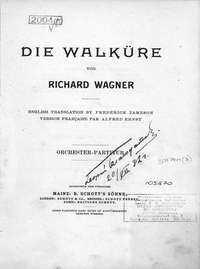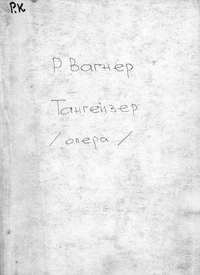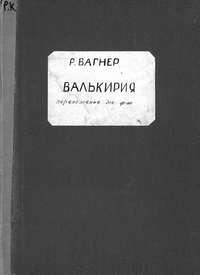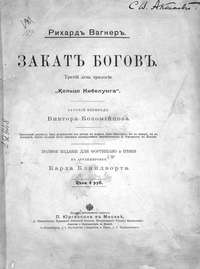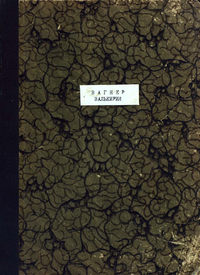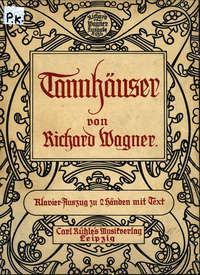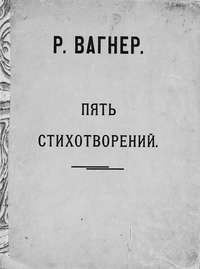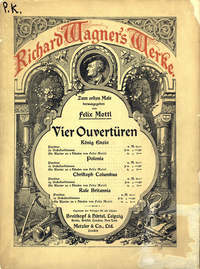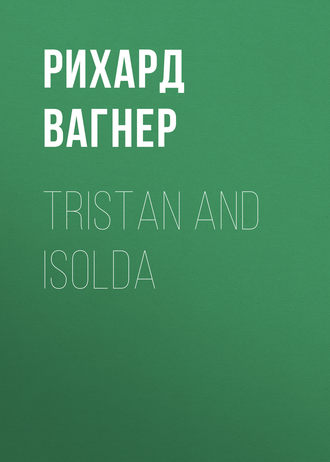 полная версия
полная версияTristan and Isolda
[People have clambered over the ship's side, others have extended a bridge, and the aspect of all indicates the immediate arrival of the expected ones, as the curtain falls.]
ACT II
[A Garden before ISOLDA'S Chamber which lies at one side and is approached by steps. Bright and pleasant summer night. At the open door a burning torch is fixed. Sounds of hunting heard.]
SCENE I
[BRANGÆNA, on the steps leading to the chamber, is watching the retreat of the still audible hunters. She looks anxiously back into the chamber as ISOLDA emerges thence in ardent animation.]
ISOLDA. Yet do you hear?I lost the sound some time.BRANGÆNA (listening). Still do they stay:clearly rings the horns.ISOLDA (listening). Fear but deludesthy anxious ear;by sounds of rustlingleaves thou'rt deceived,aroused by laughter of winds.BRANGÆNA. Deceived by wilddesire art thou,and but hear'st as would thy will:—I still hear the sound of horns.ISOLDA (listens). No sound of hornswere so sweet:yon fountain's softmurmuring currentmoves so quietly hence.If horns yet brayed,how could I hear that?In still night aloneit laughs on mine ear.My lov'd one hidesin darkness unseen:wouldst thou hold from my side my dearest?deeming that horns thou hearest?BRANGÆNA. Thy lov'd one hid—oh heed my warning!—for him a spy waits by night.Listening oftI light upon him:he lays a secret snare.Of Melot oh beware!ISOLDA. Mean you Sir Melot?O, how you mistake!Is he not Tristan'strustiest friend?May my true love not meet me,with none but Melot he stays.BRANGÆNA. What moves me to fear himmakes thee his friend then?Through Tristan to Mark's sideis Melot's way:he sows suspicion's seed.And those who haveto-day on a night-huntso suddenly decided,a far nobler gamethan is guessed by theetaxes their hunting skill.ISOLDA. For Tristan's sakecontrived was this schemeby means ofMELOT, in truth:now would you decry his friendship?He serves Isoldabetter than youhis hand gives helpwhich yours denies:what need of such delay?The signal, Brangæna!O give the signal!Tread out the torch'strembling gleam,that night may envelopall with her veil.Already her peace reignso'er hill and hall,her rapturous awethe heart does enthral;allow then the light to fall!Let but its dread lustre die!let my beloved draw nigh!BRANGÆNA. The light of warning suppress not!Let it remind thee of peril!—Ah, woe's me! Woe's me!Fatal folly!The fell pow'r of that potion!That I frameda fraud for oncethy orders to oppose!Had I been deaf and blind,thy workwere then thy death:but thy distress,thy distraction of grief,my workhas contrived them, I own it!ISOLDA. Thy—act?O foolish girl!Love's goddess dost thou not know?nor all her magic arts?The queen who grantsunquailing hearts,the witch whose willthe world obeys,life and deathshe holds in her hands,which of joy and woe are wove?she worketh hate into love.The work of deathI took into my own hands;Love's goddess sawand gave her good commandsThe death—condemnedshe claimed as her prey,planning our fatein her own way.How she may bend it,how she may end it,what she may make me,wheresoe'er take me,still hers am I solely;—so let me obey her wholly.BRANGÆNA. And if by the artfullove-potion's luresthy light of reason is ravished,if thou art recklesswhen I would warn thee,this once, oh, waitand weigh my pleading!I implore, leave it alight!—The torch! the torch!O put it not out this night!ISOLDA. She who causes thusmy bosom's throes,whose eager firewithin me glows,whose light uponmy spirit flows,Love's goddess needsthat night should close;that brightly she may reignand shun the torchlight vain.(She goes up to the door and takes down the torch.)
Go watch without—keep wary guard!The signal!—and were it my spirit's spark,smilingI'd destroy it and hail the dark![She throws the torch to the ground where it slowly dies out. BRANGÆNA turns away, disturbed, and mounts an outer flight of steps leading to the roof, where she slowly disappears. ISOLDA listens and peers, at first shyly, towards an avenue. Urged, by rising impatience, she then approaches the avenue and looks more boldly. She signs with her handkerchief, first slightly, then more plainly, waving it quicker as her impatience increases. A gesture of sudden delight shows that she has perceived her lover in the distance. She stretches herself higher and higher, and then, to look better over the intervening space, hastens back to the steps, from the top of which she signals again to the on-comer. As he enters, she springs to meet him.]
SCENE II
TRISTAN (rushing in). Isolda! Beloved!ISOLDA. Tristan! Beloved one!(Passionate embrace, with which they come down to the front.)
BOTH. Art thou mine?Do I behold thee?Do I embrace thee?Can I believe it?At last! At last!Here on my breast!Do I then clasp thee!Is it thy own self?Are these thine eyes?These thy lips?Here thy hand?Here thy heart?Is't I?—Is't thou,held in my arms?Am I not duped?Is it no dream?O rapture of spirit!O sweetest, highest,fairest, strongest,holiest bliss?Endless pleasure!Boundless treasure!Ne'er to sever!Never! Never!Unconceived,unbelieved,overpoweringexaltation!Joy-proclaiming,bliss-outpouring,high in heaven,earth ignoring!Tristan mine!Isolda mine!Tristan!Isolda!Mine alone!Thine alone!Ever all my own!TRISTAN. The light! The light!O but this light,how long 'twas let to burn!The sun had sunk,the day had fled;but all their spitenot yet was sped:the scaring signalthey set alight,before my belov'd one's dwelling,my swift approach repelling.ISOLDA. Thy belov'd one's handlowered the light,for Brangæna's fearsin me roused no fright:while Love's goddess gave me aid,sunlight a mock I made.But the light its fearand defeat repaid;with thy misdeedsa league it made.What thou didst seein shadowing night,to the shining sunof kingly mightmust thou straightway surrender,that it shouldexist in brightbonds of empty splendor.—Could I bear it then?Can I bear it now?TRISTAN. O now were weto night devoted,the dishonest daywith envy bloated,lying, could not mislead,though it might part us indeed.Its pretentious glowsand its glamouring lightare scouted by thosewho worship night.All its flickering gleamsin flashes out-blazingblind us no morewhere we are gazing.Those who death's nightboldly survey,those who have studiedher secret way,the daylight's falsehoods—rank and fame,honor and allat which men aim—to them are no more matterthan dust which sunbeams scatter,In the daylight's visions throngingonly abides one longing;we yearn to hieto holy night,where, unending,only true,Love extendeth delight!(TRISTAN draws ISOLDA gently aside to a flowery bank, sinks on his knee before her and rests his head on her arm.)
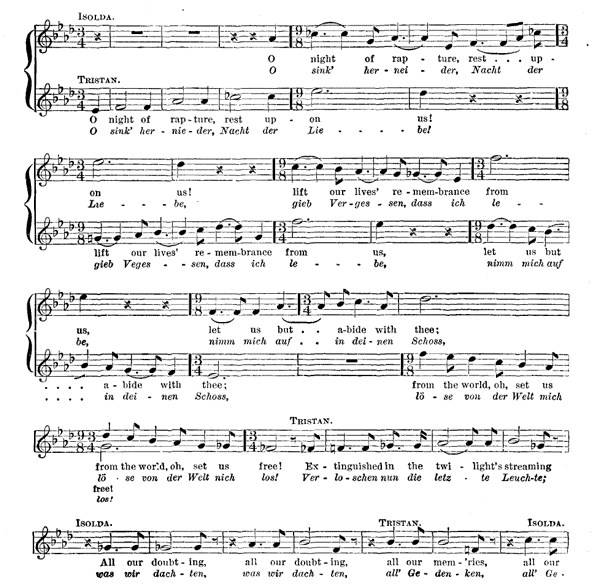
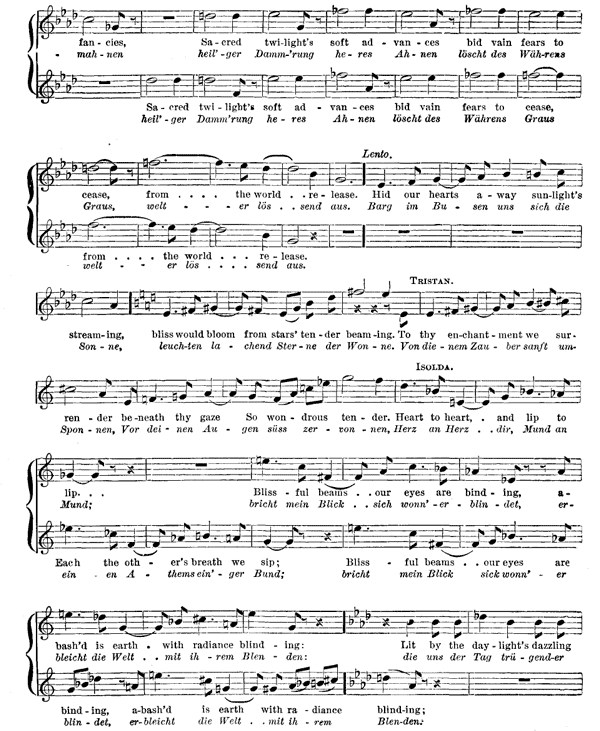
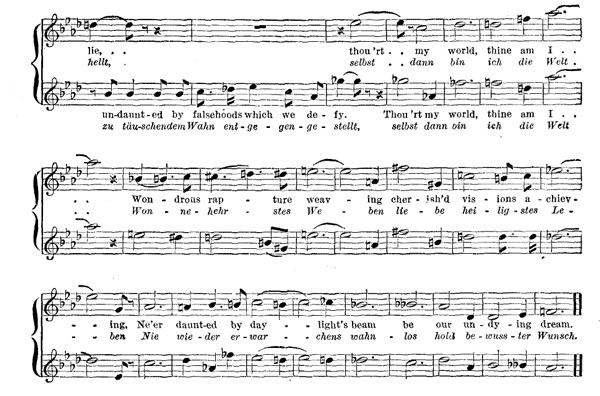
(TRISTAN and ISOLDA sink into oblivious ecstasy, reposing on the flowery bank close together.)
BRANGÆNA (from the turret, unseen). Long I watchalone by night:ye enwraptin love's delight,heed my bodingvoice aright.I forewarn youwoe is near;waken tomy words of fear.Have a care!Have a care!Swiftly night doth wear!ISOLDA. List, beloved!TRISTAN. Let me die thus!ISOLDA (slowly raising herself a little). Enviouswatcher!TRISTAN (remaining in reclining position). I'll ne'erwaken.ISOLDA. But the Daymust dawn and rouse thee?TRISTAN (raising his head slightly). Let the Dayto Death surrender!ISOLDA. Day and Deathwill both engenderfeud againstour passion tender.TRISTAN (drawing ISOLDA gently towards him with expressive action).O might we thentogether die,each the other'sown for aye!never fearing,never waking,blest delightsof love partaking,—each to each be given,in love alone our heaven!ISOLDA (gazing up at him in thoughtful ecstasy).O might we thentogether die!TRISTAN. Each the other's—ISOLDA. Own for aye,—TRISTAN. Never fearing—ISOLDA. Never waking—TRISTAN. Blest delightsof love partaking—ISOLDA. Each to each be given;in love alone our heaven.(ISOLDA, as if overcome, droops her head on his breast.)
BRANGÆNA'S VOICE (as before).Have a care!Have a care!Night yields to daylight's glare.TRISTAN (bends smilingly to ISOLDA).Shall I listen?ISOLDA (looking fondly up at TRISTAN).Let me die thus!TRISTAN. Must I waken?ISOLDA. Nought shall wake me!TRISTAN. Must not daylightdawn, and rouse me?ISOLDA. Let the Dayto Death surrender!TRISTAN. May thus the Day'sevil threats be defied?ISOLDA (with growing enthusiasm).From its thraldom let us fly.TRISTAN. And shall not its dawnbe dreaded by us?ISOLDA (rising with a grand gesture).Night will shield us for aye!(TRISTAN follows her; they embrace in fond exaltation.)
BOTH. O endless Night!blissful Night!glad and gloriouslover's Night!Those whom thou holdest,lapped in delight,how could e'en the boldestunmoved endure thy flight?How to take it,how to break it,—joy existent,sunlight distant,Far from mourning,sorrow-warning,fancies spurning,softly yearning,fear expiring,sweet desiring!Anguish flying,gladly dying;no more pining,night-enshrining,ne'er dividedwhate'er betided,side by sidestill abidein realms of space unmeasured,vision blest and treasured!Thou Isolda,Tristan I;no more Tristan,no more Isolda.Never spoken,never broken,newly sighted,newly lighted,endless everall our dream:in our bosoms gleamlove delights supreme!SCENE III
[BRANGÆNA utters a piercing cry. TRISTAN and ISOLDA remain in their absorbed state. KURVENAL rushes in with drawn sword.]
KURVENAL. Save yourself, Tristan![He looks fearfully off behind him. MARK, MELOT, and courtiers, in hunting dress, come swiftly up the avenue and pause in the foreground in consternation before the lovers. BRANGÆNA at the same time descends from the roof and hastens towards ISOLDA. The latter in involuntary shame leans on the flowery bank with averted face. TRISTAN with an equally unconscious action stretches his mantle wide out with one arm, so as to conceal ISOLDA from the gaze of the new-comers. In this position he remains for some time, turning a changeless look upon the men, who gaze at him in varied emotion. The morning dawns.]
TRISTAN. The dreary day—its last time comes!MELOT (to Mark). Now say to me, my sov'reign,was my impeachment just?I staked my head thereon:How is the pledge redeemed?Behold him inthe very act:honor and fame,faithfully Ihave saved from shame for thee.MARK (deeply moved, with trembling voice). Hast thoupreserved them?Say'st thou so?—See him there,the truest of all true hearts!Look on himthe faithfulest of friends, tooHis offenceso black and basefills my heartwith anguish and disgrace.TRISTAN traitor,what hope stayeththat the honorhe betrayethshould by Melot's rederest to me indeed?TRISTAN (with convulsive violence). Daylight phantoms—morning visionsempty and vain—Avaunt! Begone!MARK (in deep emotion). This—blow.Tristan, to me?Where now has truth fled,if Tristan can betray?Where now are faithand friendship fair,when from the fount of faith,my Tristan, they are gone?The buckler Tristanonce did don,where is that shieldof virtue now?when from my friends it flies,and Tristan's honor dies?(TRISTAN slowly lowers his eyes to the ground. His features express increasing grief while MARK continues.)
Why hast thou nobleservice done,and honor, fameand potent mightamassed for Mark, thy king?Must honor, fame,power and might,must all thy nobleservice donebe paid with Mark's dishonor?Seemed the rewardtoo slight and scantthat what thou hast won him—realms and riches—thou art the heir unto, all?When childless he lostonce a wife,he loved thee sothat ne'er againdid Mark desire to marry.When all his subjects,high and low,demands and pray'rs,on him did pressto choose himself a consort—a queen to give the kingdom,when thou thyselfthy uncle urgedthat what the courtand country pleadedwell might be conceded,opposing high and low,opposing e'en thyself,with kindly cunningstill he refused,till, Tristan, thou didst threatenforever to leaveboth court and landif thou receivedstnot commanda bride for the king to woo:then so he let thee do.—This wondrous lovely wife,thy might for me did win,who could behold her,who address her,who in prideand bliss possess her,but would bless his happy fortune?She whom I havepaid respect to ever,whom I owned,yet possess'd her nevershe, the princessproud and peerless,lighting upmy life so cheerless,'spite foes,—without fear,the fairest of bridesthou didst bring me here.Why in hell must I bide,without hope of a heaven?Why endure disgraceunhealed by tears or grief?The unexplained,unpenetratedcause of all these woes,who will to us disclose?TRISTAN (raising his eyes pitifully towards MARK).O monarch! I—may not tell thee, truly;what thou dost askremains for aye unanswered.—(He turns to ISOLDA, who looks tenderly up at him.)
Where Tristan now is going,wilt thou, Isolda, follow?The land that Tristan meansof sunlight has no gleams;it is the darkabode of night,from whence I firstcame forth to light,and she who bore methence in anguish,gave up her life,nor long did languish.She but looked on my face,then sought this resting-place.This land where Night doth reign,where Tristan once hath lain—now thither offers hethy faithful guide to be.So let Isoldastraight declareif she will meet him there.ISOLDA. When to a foreign landbefore thou didst invite,to thee, traitor,resting true,did Isolda follow.Thy kingdom now art showing,where surely we are going!why should I shun that landby which the world is spann'd?For Tristan's house and homeIsold' will make her own.The road wherebywe have to goI pray thee quickly show!—(TRISTAN bends slowly over her and kisses her softly on the forehead. MELOT starts furiously forward.)
MELOT (drawing his sword). Thou villain! Ha!Avenge thee, monarch!Say, wilt suffer such scorn?TRISTAN (drawing his sword and turning quickly round)Who's he will set his life against mine?(casting a look at MELOT).
This was my friend;he told me he loved me truly:my fame and honorhe upheld more than all men.With arrogancehe filled my heart,and led on thosewho prompted mefame and pow'r to augment meby wedding thee to our monarch.—Thy glance, Isolda,glamoured him thus;and, jealous, my friendplayed me falseto King Mark, whom I betrayed.—(He sets on MELOT.)
Guard thee, Melot![As MELOT presents his sword TRISTAN drops his own guard and sinks wounded into the arms of KURVENAL. ISOLDA throws herself upon his breast. MARK holds MELOT back. The curtain falls quickly.]
ACT III
[At one side high castellated buildings, on the other a low breastwork interrupted by a watch tower; at back the castle-gate. The situation is supposed to be on rocky cliffs; through openings the view extends over a wide sea horizon. The whole gives an impression of being deserted by the owner, badly kept, and here and there dilapidated and overgrown.]
SCENE I
[In the foreground, in the garden, lies TRISTAN sleeping on a couch under the shade of a great lime-tree, stretched out as if lifeless. At his head sits KURVENAL, bending over him in grief and anxiously listening to his breathing. From without comes the mournful sound of a shepherd's pipe.
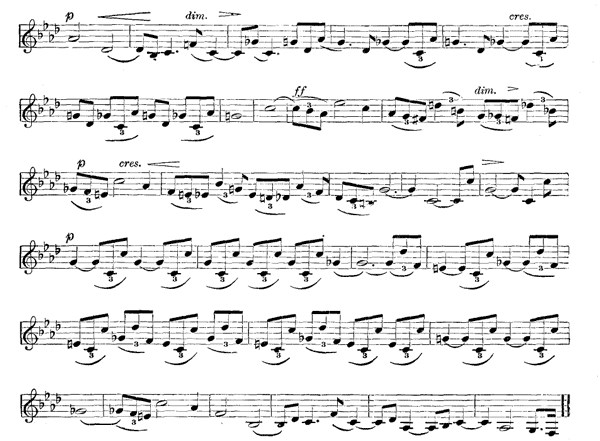
Presently the shepherd comes and looks in with interest, showing the upper half of his body over the wall.]
SHEPHERD. Kurvenal, ho!—Say, Kurvenal,—tell me, friend!Does he still sleep?KURVENAL (turning a little towards him and shaking his head sadly). If he awokeit would bebut for evermore to leave us,unless we findthe lady-leech;alone can she give help.—See'st thou nought?No ship yet on the sea?SHEPHERD. Quite another dittythen would I playas merry as ever I may.But tell me truly,trusty friend,why languishes our lord?KURVENAL. Do not ask me;—for I can give no answer.Watch the sea,if sails come in sighta sprightly melody play.SHEPHERD (turns round and scans the horizon, shading his eyes with his hand).Blank appears the sea!(He puts the reed pipe to his mouth and withdraws, playing.)
TRISTAN (motionless—faintly).The tune so well known—why wake to that?(opens his eyes and slightly turns his head).
Where am I?KURVENAL (starting in joyous surprise).Ha!—who is speaking?It is his voice!—Tristan! lov'd one!My lord! my Tristan!TRISTAN (with effort). Who—calls me?KURVENAL. Life—at last—O thanks be to heaven!—sweetest lifeunto my Tristan newly given!TRISTAN (faintly). Kurvenal!—thou?Where—was I?—Where—am I?KURVENAL. Where art thou?In safety, tranquil and sure!Kareol 'tis;dost thou not knowthy fathers' halls?TRISTAN. This my fathers'?KURVENAL. Look but around.TRISTAN. What awoke me?KURVENAL. The herdsman's dittyhast thou heard, doubtless;he heedeth thy herdsabove on the hills there.TRISTAN. Have I herds, then?KURVENAL. Sir, I say it!Thine are court,castle—all.To thee yet true,thy trusty folk,as best they might,have held thy home in guard:the gift which oncethy goodness gaveto thy serfs and vassals here,when going far away,in foreign lands to dwell.TRISTAN. What foreign land?KURVENAL. Why! in Cornwall;where cool and able,all that was brilliant,brave and noble,TRISTAN, my lord, lightly took.TRISTAN. Am I in Cornwall?KURVENAL. No, no; in Kareol.TRISTAN. How came I here?KURVENAL. Hey now! how you came?No horse hither you rode:a vessel bore you across.But on my shouldersdown to the shipyou had to ride: they are broad,they carried you to the shore.Now you are at home once more;your own the land,your native land;all loved things now are near you,unchanged the sun doth cheer you.The wounds from which you languishhere all shall end their anguish.(He presses himself to TRISTAN'S breast.)
TRISTAN. Think'st thou thus!I know 'tis not so,but this I cannot tell thee.Where I awokene'er I was,but where I wanderedI can indeed not tell thee.The sun I could not see,nor country fair, nor people;but what I sawI can indeed not tell thee.It was—the land from which I once cameand whither I return:the endless realmof earthly night.One thing onlythere possessed me:blank, unending,all-oblivion.—How faded all forebodings!O wistful goadings!—Thus I callthe thoughts that allt'ward light of day have press'd me.What only yet doth rest me,the love-pains that possess'd me,from blissful death's affrightnow drive me toward the light,which, deceitful, bright and golden,round thee, Isolda, shines.Accurséd daywith cruel glow!Must thou everwake my woe?Must thy lightbe burning ever,e'en by nightour hearts to sever?Ah, my fairest,sweetest, rarest!When wilt thou—when, ah, when—let the torchlight dwindle,that so my bliss may kindle?The light, how long it glows!When will the house repose?(His voice has grown fainter and he sinks back gently, exhausted.)
KURVENAL (who has been deeply distressed, now quickly rousts himself from his dejection).I once defied,through faith in thee,the one for whomnow with thee I'm yearning.Trust in my words,thou soon shalt see herface to face.My tongue that comfort giveth,—if on the earth still she liveth.TRISTAN (very feebly).Yet burns the beacon's spark:yet is the house not dark,Isolda lives and wakes:her voice through darkness breaks.KURVENAL. Lives she still,then let new hope delight thee.If foolish and dull you hold me,this day you must not scold me.As dead lay'st thousince the daywhen that accursed Melotso foully wounded thee.Thy wound was heavy:how to heal it?Thy simple servantthere bethoughtthat she who onceclosed Morold's woundwith ease the hurt could heal theethat Melot's sword did deal thee.I found the bestof leeches there,to Cornwall have Isent for her:a trusty serfsails o'er the sea,bringing Isold' to thee.TRISTAN (transported). Isolda comes!Isolda nears! (He struggles for words.)O friendship! highand holy friendship!(Draws KURVENAL to him and embraces him.)
O Kurvenal,thou trusty heart,my truest friend I rank thee!Howe'er can Tristan thank thee?My shelter and shieldin fight and strife;in weal or woethou'rt mine for life.Those whom I hatethou hatest too;those whom I lovethou lovest too.When good King MarkI followed of old,thou wert to him truer than gold.When I was falseto my noble friend,to betray too thou didst descend.Thou art selfless,solely mine;thou feel'st for mewhen I suffer.But—what I suffer,thou canst not feel for me!this terrible yearning in my heart,this feverish burning'scruel smart,—did I but show it,couldst thou but know it,no time here wouldst thou tarry,to watch from tow'r thou wouldst hurry;with all devotionviewing the ocean,with eyes impatiently spying,there, where her ship's sails are flying.Before the wind shedrives to find me;on the wings of love she neareth,—Isolda hither steereth!—she nears, she nears,so boldly and fast!It waves, it waves,the flag from the mast!Hurra! Hurra!she reaches the bar!Dost thou not see?Kurvenal, dost thou not see?(As KURNEVAL hesitates to leave TRISTAN, who is gazing at him in mute expectation, the mournful tune of the shepherd is heard, as before.)
KURVENAL (dejectedly).Still is no ship in sight.TRISTAN (has listened with waning excitement and now recommences with growing melancholy).Is this the meaning then,thou old pathetic ditty,of all thy sighing sound?—On evening's breezeit sadly rangwhen, as a child,my father's death-news chill'd me;through morning's mistit stole more sadly,when the sonhis mother's fate was taught,when they who gave me breathboth felt the hand of deathto them came alsothrough their painthe ancient ditty'syearning strain,which asked me onceand asks me nowwhich was the fate before meto which my mother bore me?—What was the fate?—The strain so plaintivenow repeats it:—for yearning—and dying!(He falls back senseless.)
KURVENAL (who has been vainly striving to calm TRISTAN, cries out in terror).My master! Tristan!—Frightful enchantment!—O love's deceit!O passion's pow'r!Most sweet dream 'neath the sun,see the work thou hast done!—Here lies he now,the noblest of knights,with his passion all others above:behold! what rewardhis ardor requites;the one sure reward of love!(with sobbing voice.)
Art thou then dead?Liv'st thou not?Hast to the curse succumbed?—(He listens for TRISTAN'S breath.)
O rapture! No!He still moves! He lives!and gently his lips are stirr'd.TRISTAN (very faintly). The ship—is't yet in sight?KURVENAL. The ship? Be suret'will come to-day:it cannot tarry longer.TRISTAN. On board Isolda,—see, she smiles—with the cupthat reconciles.Dost thou see?Dost thou see her now?Full of graceand loving mildness,floating o'erthe ocean's wildness?By billows of flowerslightly lifted,gently towardthe land she's drifted.Her look brings easeand sweet repose;her hand one lastrelief bestows.Isolda! Ah, Isolda!How fair, how sweet art thou!—And Kurvenal, why!—what ails thy sight?Away, and watch for her,foolish I see so well and plainly,let not thine eye seek vainlyDost thou not hear?Away, with speed!Haste to the watch-tow'r!Wilt thou not heed?The ship, the ship!Isolda's ship!—Thou must discern it,must perceive it!The ship—dost thou see it?—(Whilst KURVENAL, still hesitating, opposes TRISTAN, the Shepherd's pipe is heard without, playing a joyous strain.)
KURVENAL (springing joyously up).O rapture! Transport!(He rushes to the watch-tower and looks out.)
Ha! the ship!From northward it is nearing.TRISTAN. So I knew,so I said!Yes, she yet lives,and life to me gives.How could Isold'from this world be free,which only holdsIsolda for me?KURVENAL (shouting). Ahoy! Ahoy!See her bravely tacking!How full the canvas is filled!How she darts! how she flies!TRISTAN. The pennon? the pennon?KURVENAL. A flag is floating at mast-head,joyous and bright.TRISTAN. Aha! what joy!Now through the daylightcomes my Isolda.ISOLDA, oh come!See'st thou herself?KURVENAL. The ship is shutfrom me by rocks.TRISTAN. Behind the reef?Is there not risk!Those dangerous breakersships have oft shattered.—Who steereth the helm?KURVENAL. The steadiest seaman.TRISTAN. Betrays he me?Is he Melot's ally?KURVENAL. Trust him like me.TRISTAN. A traitor thou, too!—O caitiff!Canst thou not see her?KURVENAL. Not yet.TRISTAN. Destruction!KURVENAL. Aha! Halla-halloa Ithey clear! they clear!Safely they clear!Inside the surfsteers now the ship to the strand.TRISTAN (shouting in joy).Hallo-ho! Kurvenal!Trustiest friend!All the wealth I ownto-day I bequeath thee.KURVENAL. With speed they approach.TRISTAN. Now dost thou see her?See'st thou Isolda?KURVENAL. 'Tis she! she waves!TRISTAN. O woman divine!KURVENAL. The ship is a-land!Isolda.'—ha!—With but one leaplightly she springs to land!TRISTAN. Descend from the watch-tow'r,indolent gazer!Away! awayto the shore!Help her! help my belov'd!KURVENAL. In a trice she shall come;Trust in my strong arm!But thou, Tristan,hold thee tranquilly here!(He hastens off.)




